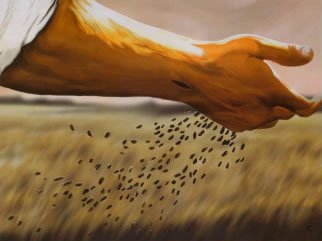WONDERING GURU
👉17th Sunday in Ordinary Time, Psalter Week -1, 30th July 2023
Fr
Nelson Lobo OFM Cap
WHY Solomon made such a good and wise choice
in response to God’s question? I can think of two reasons:
1. His Father’s
influence-The first reason was the good influence of David his
father. We read in 1 Kings 2:1-3 of David giving Solomon a solemn charge “I am
about to go the way of all earth…So be strong, show yourself a man and observe
what the Lord your God requires: Walk in his ways and keep his decrees and
commands, his laws and his requirements …” (2 Kings 2: 2-3) Parents can have a
real influence on their children – for good and for evil.
2. Solomon was
committed to God’s will for him. He actually decided for
himself that he would follow the ways of God. We cannot make a commitment to
God for anyone else except ourselves. Parents can pray for their children and
advise them but it is still THEIR decision whether or not they commit
themselves to following God. As they say:
“You can take a horse to water but you can’t make it drink.” David wanted his
son to follow God’s ways, but Solomon still had to decide to do so for himself.
2nd Reading: (Romans
8:28-30)- A young boy traveling by airplane to visit his
grandparents sat beside a man who happened to be a seminary professor. The boy
was reading a Sunday school take-home paper when the professor thought he would
have some fun with the lad. "Young man," said the professor, "If
you can tell me something God can do, I"ll give you a big, shiny
apple." The boy thought for a moment and then replied, "Mister, if you
can tell me something God can’t do, I"ll give you a whole barrel of
apples!"
Even though many
Christians can quote Romans 8:28, few of them fully realize the GREATER GOOD
spoken about in the text. Only when we are able to completely surrender our
rights, problems and perspectives to the Lord can we fully appropriate the
greater working of God through our disappointments, hurt and difficulties. So be
willing to roll all of your cares, fears and feelings of anger on to the Lord.
(I Pet. 5:7). Learn to lovingly accept whatever God allows to come into your
life since He is able to deliver you from any and all problems.
Gospel: (Mt 13:
44-52) The pearl is the oyster’s answer to that which wounded
it. The pearl owes its existence to the oyster’s willingness to cover that
which had cut it. Our part was the cutting, and God’s part was the covering.
A new convert to Christ
says: "I found Christ." Yes, it may seem like we did find Christ. But
it is Christ who offers the Treasurer and the Pearl to the people traveling
along life's highway. The Truth is the sinner cannot "find Christ"
for he is blind and stubborn. "There is no one who is righteous, not even
one; there is no one who has understanding, there is no one who seeks
God." (Rom 3:10)
Common
interpretation: The Pearl and the treasure represents
Jesus Christ, and the man is a seeker who gives all he has to obtain salvation.
He turned his back on all he had to achieve heaven. This involves single minded purpose and total
commitment and dedication on the part of the seeker to find the pearl or the
treasure that is Jesus Christ. True discipleship asks us to give up
things and put on Christ, but that is sanctification, not salvation.
New Interpretation: People aren’t seeking Jesus, but rather, Jesus is seeking them. This is the work of the Holy Spirit to call, to convict, to convince. The merchant man is Christ, and we, the church is that pearl which He purchases at great cost. He gave His all on calvary. He seeks and saves that which was lost. The pearl is a perfect picture of the church. It is formed miraculously, and for the purpose of being presented back to its maker. Its creator is the owner, just as the church was founded by Christ and is His bride! You are His pearl of great price, buried in a sea of sinfulness, lost, just a grain of sand, and He has poured out Himself upon you until you have become His godly pearl.






